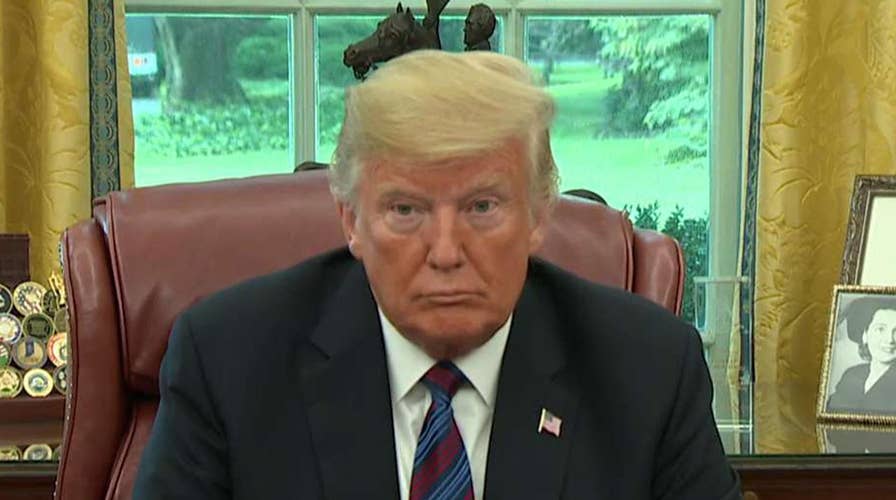President Trump announces new trade deal with Mexico
Joined on the phone by Mexican President Enrique Peña Nieto, President Trump announces the United States-Mexico Trade Agreement, an understanding with Mexico that could lead to overhaul of NAFTA.
President Trump won a major victory on trade on Monday, supplanting the North American Free Trade Agreement (NAFTA) and replacing it with something far more beneficial. The new deal will help American workers and manufacturers. It’s also a win for Mexico.
One of the most fundamental parts of Trump’s campaign for president was his promise to change America’s deeply flawed trade arrangements. These deals left us with massive $500 billion trade deficits—a huge drag on the economy—and devastated forgotten communities across America that are dependent on manufacturing jobs.
Second only to the booming economy, Monday’s announcement of a deal with Mexico is the most visible manifestation of Trump’s fulfilment of his campaign promises. Last year, the USA had a large $71 billion trade in goods deficit with Mexico, owing in part to much lower worker pay. This new deal will limit Mexico’s ability to take U.S. manufacturing jobs by underpaying workers.
Another key part of the new trade deal increases the percentage of a car that must be made in North America to qualify for lower-tariff import into the USA. This will be a major boon to American automotive workers and that industry’s domestic supply chain.
Trump understood the simple math that countries with which we have trade deficits would have to come to the negotiating table.
More broadly, the deal vindicates Trump’s approach to trade, which has been lambasted by voices ranging from Wall Street to the national security establishment to the Chamber of Commerce, as well as mavens from both political parties.
They said nothing could come from Trump’s unilateral imposition of tariffs in order to get foreign governments to negotiate seriously. They said a “trade war” would be self-defeating.
On Monday, they have been proved wrong by an unmitigated victory for the USA.
Trump understood the simple math that countries with which we have trade deficits would have to come to the negotiating table. By definition, we buy more from them than they buy from us, which gives us the power any major consumer has over a seller. These countries also cannot afford to lose access to our $20 trillion economy—the world’s largest. Trump realized the power this gives us and decided to use it to level the playing field for American workers—unlike other recent presidents.
This victory will lead to others. The leftwing government of Canada, the other member of NAFTA, had refused to negotiate seriously, perhaps believing their friends in the progressive commentariat predicting Trump’s demise.
Canada’s foreign minister, Chrystia Freeland, spent most of her time on visits to the U.S. lobbying governors and congressmen rather than talking seriously to our trade negotiators. Her boss, Prime Minister Justin Trudeau, even though it was a good idea to antagonize Trump at his failed G7 summit in June.
Canada must now return, hat in hand, for a deal. If not, Trump will advance the deal with Mexico and leave Canada behind. Today he again vowed to raise car tariffs on Canada if it refuses to revise unfair levies of nearly 300 percent on some American goods, among other unfair practices.
The European Union and China will also be greatly concerned about the Mexico deal—and more likely to negotiate seriously.
Europe last year had a $151 billion surplus with the USA. When combined with the fact that we pay for most of their defense through NATO, Europe has benefited greatly from past U.S. administrations’ willingness to let Europe leach off of American workers and taxpayers.
The deal with Mexico and Canada’s likely about-face puts pressure on Europe to level the playing field for trade or face higher tariffs. This is especially true of Germany, one of the world’s most export-dependent major economies.
The same factors apply to China, which is dependent on selling goods to the USA and stealing our companies’ intellectual property.
Trump has utterly flipped the script with China, which our elite effectively told us would supplant us economically and strategically, and with which we had to accept unfair trade factors. Now, China is reeling and American is ascendant. Those who bet on China over the USA chose poorly.
Looking ahead to Trump’s reelection fight in 2020, the win on Mexico and other likely victories will position him extremely well. Trump flipped states like Michigan, Pennsylvania, and Ohio from Democrat to Republican in 2016 by promising economic prosperity in part by improving trade deals. Delivering on that promise with plenty of time to convey facts to voters means his prospects for reelection look excellent.





















